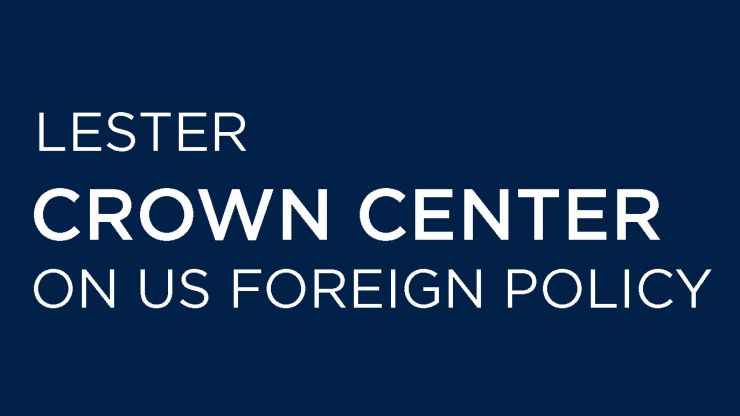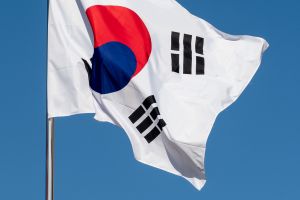American's favorable views of South Korea are at an all-time high and a majority of Americans support using US troops to defend South Korea if invaded by North Korea.
Introduction
The Trump presidency has strained relations with several Asian allies, including South Korea. But the 2020 Chicago Council Survey results show that President Donald Trump’s repeated threats and bullying tactics on defense and trade issues with Seoul have done little to soften support among the American public for the alliance with South Korea. In fact, favorable views of South Korea are now at an all-time high.
Key Findings
- Among Americans, South Korea’s favorability rating is now 60 on a zero-to-100 scale, the highest yet recorded in Council surveys. North Korea receives a mean score of 19—the lowest of any country included in the survey.
- Three-quarters (73%) say South Korea should either be more involved (32%) or as involved as now (41%) in addressing the world’s problems.
- A plurality (47%) say South Korea’s handling of the coronavirus pandemic has either been very (21%) or somewhat (26%) effective. This is markedly higher than the perceived effectiveness of the United States (37% net effective) and China (36% net effective).
- Two-thirds (68%) say South Korea practices fair trade with the United States—an all-time high.
- A majority (58%) favor using US troops to defend South Korea if it is invaded by North Korea.
- Half (51%) say North Korea’s nuclear program is a critical threat to the United States—an all-time low.
- Just 14 percent think negotiations will lead to North Korea giving up its nuclear weapons.
- Three in ten (29%) support air strikes against North Korea’s nuclear production facilities—an all-time low. And one-quarter (24%) support sending US troops to destroy North Korea’s nuclear facilities—another all-time low. But the least-supported option among the American public is to accept that North Korea will produce additional nuclear weapons (11%).
South Korea's favorability at all-time high
Over the past year, South Korea has experienced an unprecedented boom in awareness of its cultural products and global influence. Its musical acts have regularly featured in the Billboard charts and sold out arenas around the United States. A Korean film, Parasite, became the first foreign film to win Best Picture at the American Academy Awards. Netflix has brought Korean television shows into more US homes than ever before. And South Korea’s handling of COVID-19 has won plaudits from the international community, laying out a playbook for other countries in how to deal with outbreaks.
This continued success on the global stage has likely contributed to increasingly favorable views of South Korea among the American public. This year those favorable views are at an all-time high, with South Korea receiving a mean favorability score of 60 on a scale of zero to 100, with zero representing negative feelings toward a country and 100 representing warm feelings. This is up from 55 when the question was last asked in 2016 and up from 47 when the question was first asked in 1978. It is worth noting that South Korea’s favorability is at record highs among Democrats (58), Republicans (60), and Independents (61).
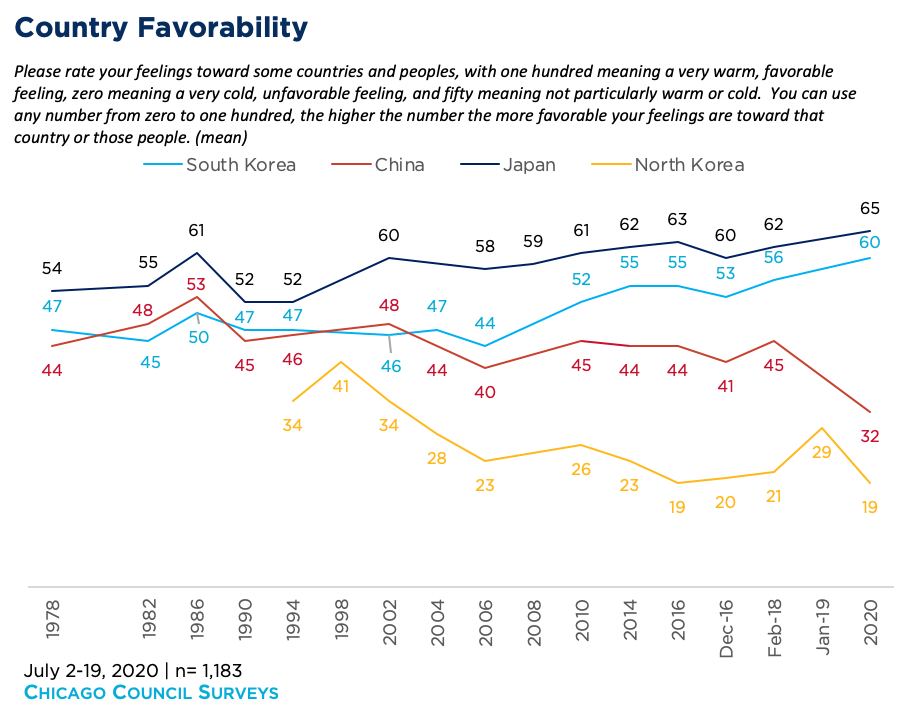
But positive views of South Korea go beyond favorable views of the country. Three-quarters (73%) say South Korea should either be more involved (32%) or as involved as now (41%) in addressing the world’s problems. While identifying reasons for this view is difficult, it may partly grow out of positive views of South Korea’s handling of the COVID-19 pandemic. Among Americans, a plurality (47%) say South Korea’s handling of it has either been very (21%) or somewhat (26%) effective. This placed it well above the perceived effectiveness of the United States (37% net effective) and China (36% net effective).
The United States and South Korea seen as mostly partners
One of the pillars of the Trump presidency has been to question the value of alliances by painting allies as taking advantage of the United States. The American public, however, has not yet followed suit. Nearly six in ten Americans (59%) say alliances in East Asia either benefit both countries (52%) or mostly benefit the United States (7%). And if given a choice, a majority of Americans (77%) want to continue to put a higher priority on building up strong relations with traditional allies like South Korea and Japan, even if this might diminish relations with China.
South Korea, in particular, has been singled out by Trump for failing to pay its fair share for its defense and for being an unfair trading partner. Despite these attacks on South Korea from the American president, three-quarters of Americans (74%) continue to say the United States and South Korea are mostly partners, up from 65 percent when the question was first asked in 2012. And if North Korea invaded South Korea, a majority of Americans (58%) favor using US troops to defend South Korea. This is unchanged from 2019.
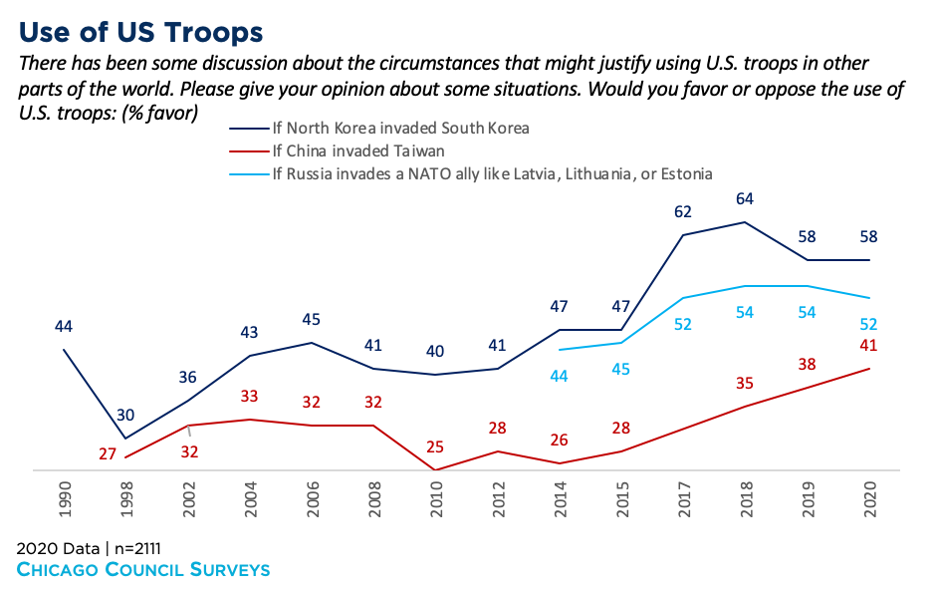
A record high (68%) also say South Korea practices fair trade with the United States, up from 53 percent when this question was last asked in 2017 and from 49 percent when the question was first asked in 2004. These numbers are consistent across partisan supporters.
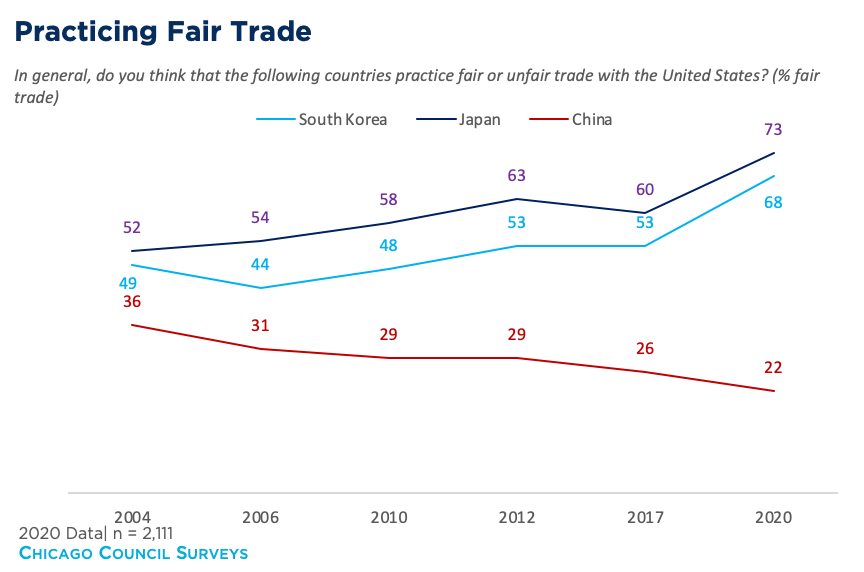
Dealing with North Korea
Little progress has been made toward the stated US goal—the denuclearization of the Kim Jong Un regime—since the 2019 Hanoi summit. Trump has claimed that his well-documented letter exchanges with Kim are evidence that the two countries are on the right track. Among the American public, however, there is little confidence that negotiations will lead to North Korea giving up its nuclear weapons.
While positive feelings have never been higher toward South Korea, the opposite is true of North Korea. On the zero-to-100 scale, North Korea notches a mean of 19, tying the lowest on record from 2016. The high-water mark came in 1998, when mean favorability was 41. Moreover, favorability of North Korea does not seem to be correlated with the perceived threat of its nuclear weapons program. In 2017, 75 percent—an all-time high—said North Korea’s nuclear program was a critical threat facing the United States. As tensions have cooled between the United States and North Korea, so to have perceptions of that threat. In 2020, 51 percent cite the North’s nuclear weapons program as a critical threat—an all-time low. Despite this decline, views of North Korea remain deeply unfavorable.
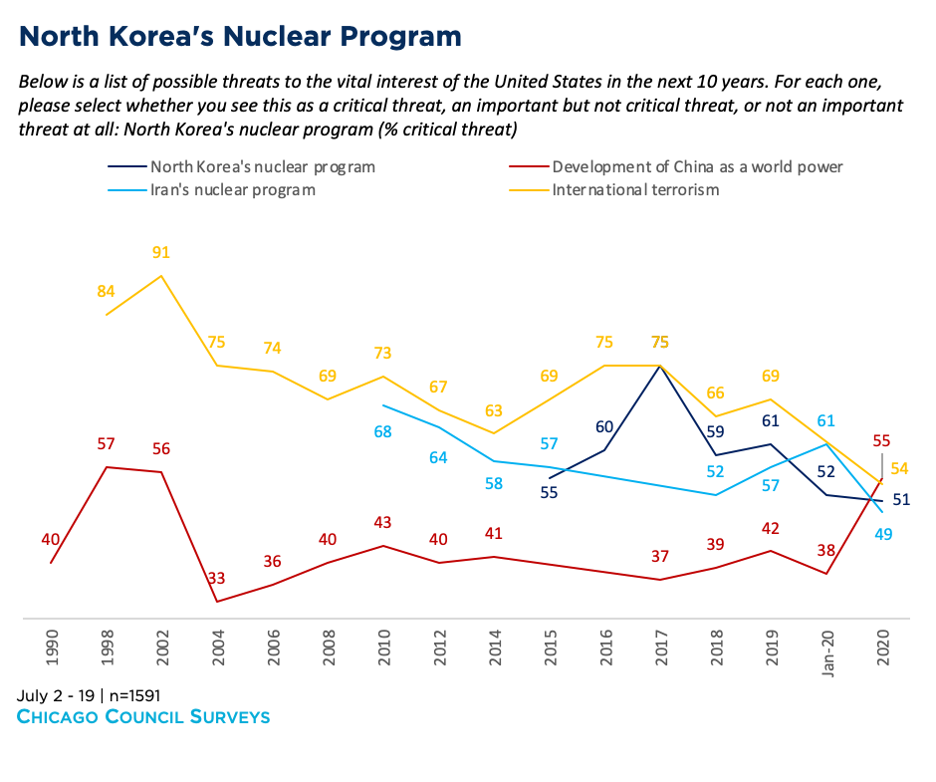
In dealing with the North’s nuclear program, few good options remain—a reality reflected in American public opinion. There is little confidence that negotiations between the United States and North Korea will lead to North Korea giving up its nuclear weapons. Just 14 percent say they are either very confident (2%) or somewhat confident (12%) in that outcome. Meanwhile, 43 percent say they are not very confident and a further 40 percent say they are not confident at all in negotiations leading to North Korea giving up its nuclear weapons.
At the same time, there is little support for military action against North Korea. Three in ten (29%) support air strikes against North Korea’s nuclear production facilities—an all-time low. And one-quarter (24%) support sending US troops to destroy North Korea’s nuclear facilities—another all-time low. But the least-supported option among the American public, as it has been since the question was first asked in 2015, is to accept that North Korea will produce additional nuclear weapons (11%). Three in ten (28%) support an agreement that North Korea will possess nuclear weapons in exchange for a promise that it will not produce more of them. And 55 percent disagree that the United States should learn to live with countries like North Korea and Iran possessing nuclear weapons, just as we do with Russia and China.
Methodology
This analysis is based on data from the 2020 Chicago Council Survey of the American public on foreign policy, a project of the Lester Crown Center on US Foreign Policy. The 2020 Chicago Council Survey was conducted July 2–19, 2020, by Ipsos using its large-scale nationwide online research panel, KnowledgePanel, among a weighted national sample of 2,111 adults, 18 years of age or older, living in all 50 US states and the District of Columbia. The margin of sampling error for the full sample is ±2.3 percentage points, including a design effect of 1.2056. The margin of error is higher for partisan subgroups or for partial-sample items.
Partisan identification is based on respondents’ answer to a standard partisan self-identification question: “Generally speaking, do you think of yourself as a Republican, a Democrat, an Independent, or what?”
